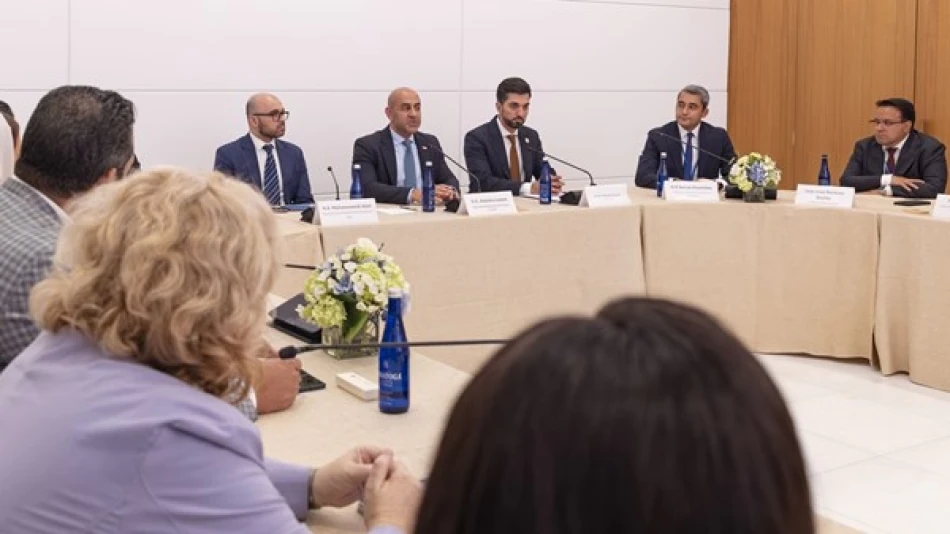
UAE Advocates Bolstering Global Economic Growth at UN Forum
UAE Positions Itself as Global Hub for Sustainable Economic Growth Beyond 2030
The United Arab Emirates is leveraging its economic diversification success to shape global sustainable development policies, as the country takes center stage at the UN's High-Level Political Forum on Sustainable Development in New York. With ambitious post-2030 development goals on the horizon, the UAE is positioning itself as a bridge between developed and emerging economies, offering its balanced growth model as a blueprint for inclusive economic transformation.
Strategic Timing for Global Leadership
The UAE's prominent role at the 2025 UN forum comes at a critical juncture. As the international community prepares to set new development goals for post-2045 (XDGs), the Emirates is capitalizing on its track record of economic resilience and diversification. The country's participation goes beyond diplomatic protocol—it represents a calculated move to influence global economic policy frameworks.
Abdullah Nasser Lootah, Assistant Minister for Cabinet Affairs for Competitiveness and Knowledge Exchange, emphasized that the UAE's development model offers "practical solutions" for emerging economies. This positioning is particularly significant as traditional development aid models face scrutiny and countries seek more sustainable, partnership-based approaches to growth.
Private Sector Investment as Development Engine
Bridging the Global Skills Gap
The UAE's approach centers on mobilizing private sector investment to drive sustainable growth—a strategy that mirrors successful models in Singapore and Switzerland. Mohammed Al Hawi, Undersecretary of the Ministry of Investment, highlighted how the country enables "investors, entrepreneurs, innovators, researchers, and youth" through transformative investment flows.
This focus on skills development addresses a critical global challenge. As automation and AI reshape labor markets worldwide, the UAE's emphasis on "future work skills" positions it as a solutions provider for developing nations grappling with technological disruption.
Economic Diplomacy as Stability Tool
The UAE organized two pivotal sessions examining how economic diplomacy can enhance societal and global stability. This approach reflects lessons learned from the country's successful mediation in regional conflicts and its role as a neutral business hub during geopolitical tensions.
By linking economic growth to peace and strong institutions (UN Sustainable Development Goal 16), the UAE is advocating for a model where business interests align with stability—a particularly relevant message as global supply chains face ongoing disruptions.
Market Implications and Investor Perspective
For international investors, the UAE's sustainable development leadership signals several opportunities. The country's integrated approach to innovation, talent development, and sustainable growth creates a favorable environment for long-term investments, particularly in green technology and knowledge-based industries.
The emphasis on "transformative investment flows" suggests the UAE is preparing to channel significant capital toward sustainable development projects, both domestically and in emerging markets. This could position the country as a key financier and implementer of post-2030 development initiatives.
Competitive Positioning Against Regional Rivals
The UAE's sustainable development diplomacy also serves to differentiate it from regional competitors. While Saudi Arabia focuses heavily on Vision 2030 and megaprojects, the UAE is positioning itself as the practical implementer of sustainable development—the country that can deliver results rather than just announce ambitious plans.
This strategy builds on the UAE's existing advantages: its status as a global business hub, its diversified economy less dependent on oil revenues, and its track record of successful large-scale projects from renewable energy to space exploration.
Beyond 2030: Shaping the Next Development Era
The UAE's participation in discussions about post-2045 development goals (XDGs) reveals strategic foresight. By contributing to the framework design now, the country ensures its development model and priorities will influence global policy for decades to come.
This long-term thinking reflects the UAE's broader strategy of positioning itself as indispensable to global economic stability. As traditional powers face internal challenges and emerging economies struggle with development financing, the UAE offers itself as a stable, capable partner for sustainable growth initiatives.
The country's balanced approach—combining economic growth with social development and environmental sustainability—provides a pragmatic alternative to ideologically driven development models. For a world seeking practical solutions to complex challenges, the UAE's message is clear: sustainable development requires patient capital, strategic partnerships, and proven implementation capabilities—all areas where the Emirates has demonstrated consistent success.
Most Viewed News

 Layla Al Mansoori
Layla Al Mansoori






